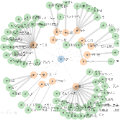A commonly observed problem with abstractive summarization is the distortion or fabrication of factual information in the article. This inconsistency between summary and original text has led to various concerns over its applicability. In this paper, we propose to boost factual correctness of summaries via the fusion of knowledge, i.e. extracted factual relations from the article. We present a Fact-Aware Summarization model, FASum. In this model, the knowledge information can be organically integrated into the summary generation process via neural graph computation and effectively improves the factual correctness. Empirical results show that FASum generates summaries with significantly higher factual correctness compared with state-of-the-art abstractive summarization systems, both under an independently trained factual correctness evaluator and human evaluation. For example, in CNN/DailyMail dataset, FASum obtains 1.2% higher fact correctness scores than UniLM and 4.5% higher than BottomUp.
翻译:一个常见的抽象总结问题就是文章中事实信息的歪曲或编造。摘要和原始文本之间的这种不一致导致人们对其适用性的各种关切。在本文中,我们提议通过综合知识,即从文章中摘取事实关系,来提高摘要的事实正确性。我们提出了一个事实软件总结模型FASum。在这个模型中,知识信息可以通过神经图计算有机地融入摘要生成过程,并有效地改善事实正确性。经验性结果表明,FASum生成摘要时,与最先进的抽象总结系统相比,事实正确性要高得多,两者都是在经过独立培训的事实正确性评估和人类评估之下。例如,在CNN/DailyMail数据集中,FASum获得比ULM高1.2%的事实正确性分数,比PownUP高出4.5%。



